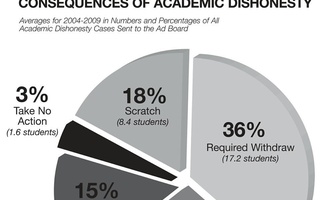For over 100 years, the Administrative Board has been a stable, if at times ominous, institution on campus. Beginning next academic year, the Ad Board will implement the largest structural changes in its history, changes that will alter both the types of cases and the number of cases the Board will deliberate on in the future.
For many students, the Ad Board has largely been shrouded in mystery. But the infamous Government 1310 cheating debacle and the federal government's recent investigations into the handling of sexual assault cases have highlighted a need to alter the responsibilities of the disciplinary body. When the honor code is implemented and a student-faculty body begins hearing cases of academic dishonesty, the Ad Board will no longer examine the vast majority of cases dealing with cheating. And with the recent creation of the Office for Sexual and Gender-Based Dispute Resolution, the Board will also no longer be primarily responsible for investigating cases of sexual violence. Instead, the Ad Board will focus its attention on cases related to student abuses of drugs and alcohol and administrative procedures like student petitions to simultaneously enroll in classes.
This separation of disciplinary powers will certainly benefit students.
The presence of a body perhaps imbued with extraordinary disciplinary powers but with scant information about its procedures available to undergraduates was harmful for the reputation of the university. Students need to feel that disciplinary action exists to give an incentive for good behavior, not to instill fear that a minor transgression will destroy their academic careers or that even if they offer honest defenses of their actions that their words will fall on deaf ears. Hopefully the honor code and the soon-to-be-developed honor board will help develop a culture among students to take cases of academic dishonesty very seriously. This is an issue of student culture, but the change in the composition of the Ad Board is an excellent first step in the right direction.
The slimming down of the Ad Board's jurisdiction is also helpful for students because the new disciplinary bodies will have more specific tasks. It is embarrassing that Harvard continues to suffer from a plague of sexual assault and sexual harassment cases, and further that endemic issues within administrative bodies have led to several cases in which assaulters are forgiven and victims are left feeling unsafe on campus. The creation of an independent body composed partially of experts in interpreting cases of sexual violence and focused on assembling all the facts in these cases ensures that these tragedies will be top priorities, handled properly.
It remains to be seen how the honor board and ODR will affect the Ad Board itself in practice. But for now, it is heartening to see the Ad Board and its spin-offs promising a more constructive collective role.
Read more in Opinion
Give Me That Old-Time ReligionRecommended Articles
-
 Ad Board Grapples with Plagiarism
Ad Board Grapples with Plagiarism -
Students Protest Ad BoardThe Administrative Board—the primary disciplinary body of Harvard College—came under fire in 1986 after the Board handed down punishments in two separate cases that were perceived by students as unduly harsh given the nature of the offenses.
-
Administrative Board Disciplinary Cases Increase By 150%The Secretary of the Ad Board attributes the increase to a year-old reform which has encouraged professors and students to turn in more students for academic dishonesty.
-
Crime and PunishmentNew policies allow for more leeway in judging cases and provide for penalties that vary in seriousness with the crimes they are made to address.
-
Ad Board's Educational Mission Under ScrutinyThis fall, some of the roughly 125 students accused of improperly collaborating in Government 1310: “Introduction to Congress” will likely be forced to take a year off from school, a punishment that some say will dog them long after their undergraduate years but teach them nothing about appropriate academic practices.
-
Ad Board Cheating Statistics from Year That Saw Gov 1310 Yet To Be Made PublicThe unreleased statistics are expected to show a number of forced withdrawals in academic dishonesty cases at least three-and-a-half times higher than the previous five-year average of 21.













